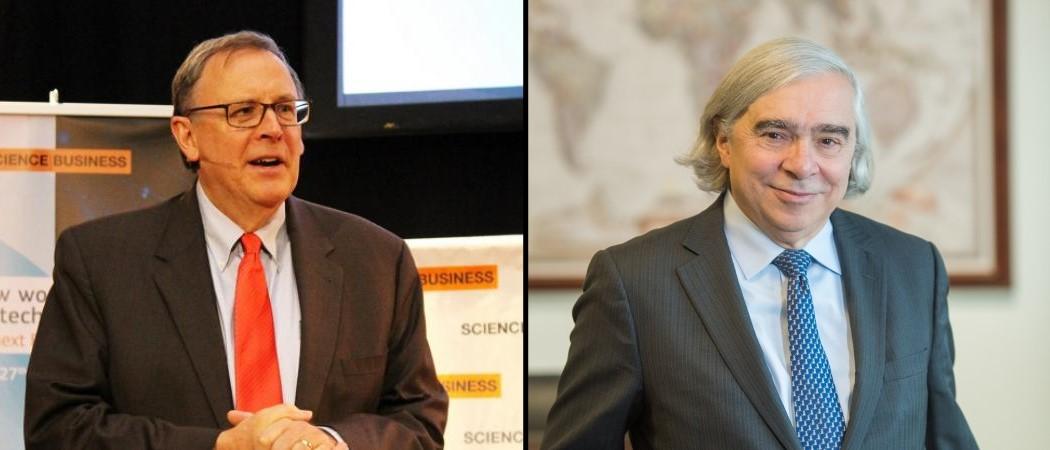As the US rejoins the Paris agreement, Ernest J. Moniz, former US energy secretary, urges bigger budgets, broader ambitions for climate technologies. ‘We need to know which of these dogs can hunt by 2030’

Richard Hudson (on the left), Editor-in-Chief at Science|Business, and Ernest J. Moniz (on the right), former US energy secretary.
Europe and the US need to boost their investments in a wider range of carbon-busting technologies, and make the 2020s “a decade of supercharged innovation” for climate control, according to former US President Barrack Obama’s energy secretary.
In an interview with Science|Business, Ernest J. Moniz – now emeritus professor at Massachusetts Institute of Technology - argued that “we’re going to need innovation” to cut greenhouse gas emissions to net zero by 2050, and then go further and actually reverse carbon dioxide levels.
For that, he said, the world needs to explore a wide range of technologies, including such politically controversial options as nuclear power or carbon storage. And that will require boosting government spending on climate technologies. Though both the US and Europe are spending more on climate R&D funding, he said, “frankly I think we need to like triple the amount of funding that we have. This has to be a decade of supercharged innovation.”
With many technology options possible, “we need to know which of these dogs can hunt by 2030. This is the time when we really need to juice up that innovation agenda and get through research, development, demonstration and some deployment by 2030. Or the world isn’t going to be able to do the job of massive deployment by 2050.”
Moniz was US energy secretary from 2013 to 2017, and a key player in the global climate agreement reached in Paris in 2015 – from which the Trump administration withdrew, and the new Biden administration has now rejoined. He is currently CEO of a Washington climate organisation, the Energy Futures Initiative, which has been analysing climate technology options. He spoke to Science|Business on the occasion of its annual membership conference 22-23 February.
The new-look US climate policy
In his view, there’s a massive change in US political and business attitudes towards climate – notwithstanding Donald J. Trump. For instance, he noted, last year the Democratic Party picked climate as “a winning political issue in a campaign; that’s a really big deal.” Since his start January 20, President Joe Biden has issued a flurry of orders undoing Trump climate policies, has appointed a climate czar, and made climate a responsibility of every member of his Cabinet.
Further, Moniz said, there has been “a very profound shift on the industry side.” He noted 26 US electric utilities have set net zero carbon commitments, GM and Ford are promising all-electric fleets, and even ExxonMobil, the world’s largest oil company and a long time climate denier, has started to change. “So I think that we are at a serious inflection point” in American attitudes towards climate.
A key point, he argued, is that as governments in Washington and around the world step up their climate efforts, they should avoid taking any technological options off the table.
For instance, he said some countries may need nuclear reactors to cut their greenhouse gas emissions. But in some European countries, “there is a phobia about developing advanced nuclear power technologies. That’s a dreadful mistake, because some places are going to need that as part of their solution.”
Equally, some oppose technologies to capture and store carbon dioxide, because they could provide an excuse for industry to keep burning fossil fuels. Other technologies could breed or genetically engineer plants to absorb extra carbon dioxide, or remove greenhouse gases from the ocean surface – also controversial ideas to some. These may be needed – or at least should be explored – if the world is going to hit the Paris climate targets of net zero emissions, and then go on to have “net negative emissions” in the second half of the century. “A net negative economy needs by definition net negative technologies being deployed.”
“The point here is, there is in principle a large portfolio of approaches addressing carbon dioxide removal. They’ve barely been touched. They need to be explored. They are a critical component, I believe, of reaching net zero and eventually net negative emissions.”
He called the EU’s Green Deal programme “the right framework” for action, but more effort, money and cooperation will be needed. For that, he said, politicians will have to build coalitions – which means keeping options open.
“If business isn’t part of the coalition that’s a big headwind to fight. If jobs aren’t created, that’s a big headwind to fight. If we don’t worry about stranded assets of utilities, for example, but also stranded people and stranded communities, we’re gonna have a big headwind….If you start saying no, rather than yes, to what might be part of the solution to low carbon, you fracture coalitions rather than forge them.”





 A unique international forum for public research organisations and companies to connect their external engagement with strategic interests around their R&D system.
A unique international forum for public research organisations and companies to connect their external engagement with strategic interests around their R&D system.